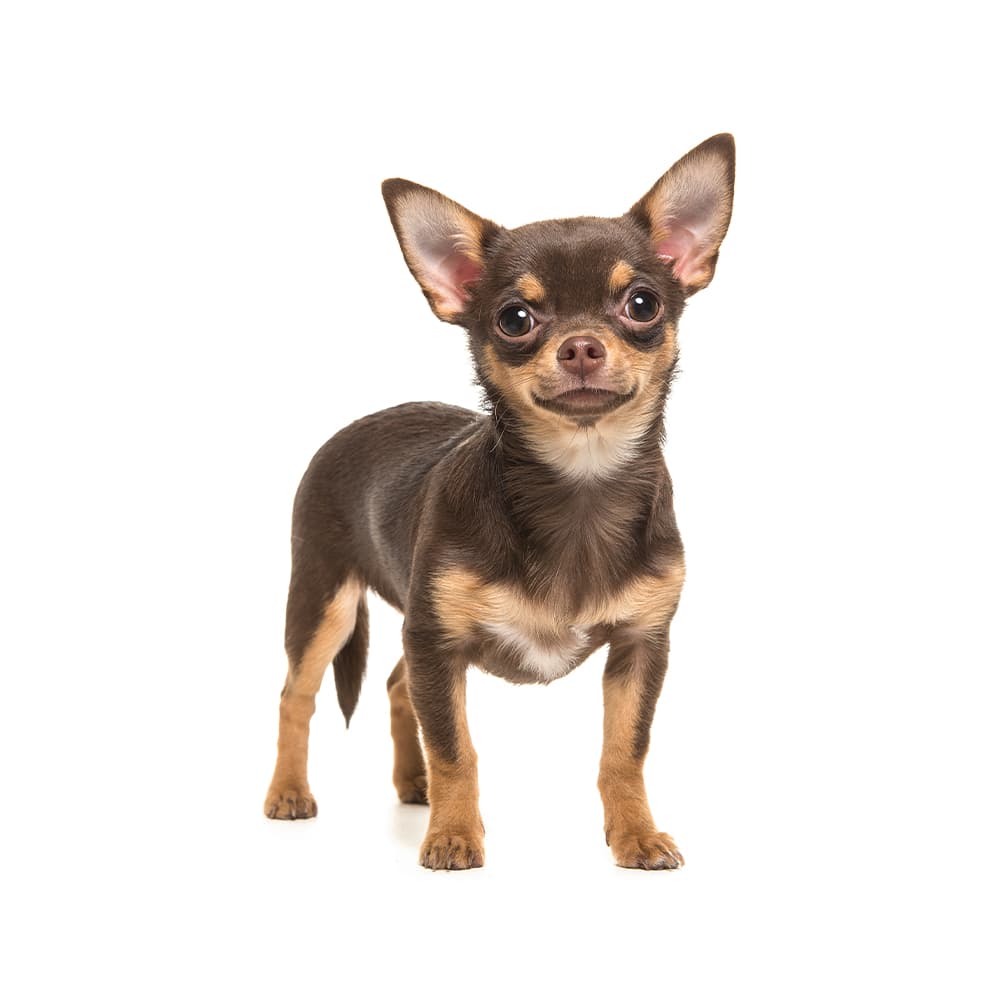Discover your dog's connection to this breed and 200+ others


Discover your dog's connection to this breed and 200+ others



The Chihuahua is one of the oldest breeds of the Americas, with its origins traced back to the ancient civilizations of Mexico. The breed is named after the Mexican state of Chihuahua, where the earliest specimens of the breed were discovered in the mid-19th century. Ancient artifacts from various Mexican civilizations, including the Toltec and Aztec societies, depict small dogs that closely resemble modern Chihuahuas, suggesting that this breed has a rich and extensive history. It's believed that these dogs were kept for religious purposes and were considered sacred. With the arrival of the Spanish, many of these native dogs were nearly wiped out, but some survived in remote villages, eventually being discovered by American tourists in the 19th century. The breed quickly gained popularity in the United States and was recognized by the American Kennel Club (AKC) in 1904.
Chihuahuas can suffer from Alexander disease, atlantoaxial instability, brachygnathism, cataracts, Chiari-like malformation, chondrodystrophy, color dilution alopecia, corneal dystrophy, cryptorchidism, cystinuria, deafness, demodicosis, dystocia, eclampsia, elbow dysplasia, epilepsy (Lafora body disease), Factor VIII deficiency (hemophilia A), follicular dysplasia, gallbladder mucocele, glaucoma, hernia (inguinal), hip dysplasia, hydrocephalus, hypoglycemia, hypothyroidism, keratoconjunctivitis sicca, Legg–Calvé–Perthes disease, macrothrombocytopenia, meningoencephalitis (necrotizing), molera, methemoglobin reductase deficiency, mitral valve disease, muscular dystrophy, myasthenia gravis, myelodysplasia, narcolepsy, neuroaxonal dystrophy, neuronal ceroid lipofuscinosis, neuronal ceroid lipofuscinosis 7, osteochondritis dissecans (shoulder), panniculitis, patellar luxation, patent ductus arteriosus, persistent pupillary membranes, polydontia, polydontia (retained primary teeth), portosystemic shunts, prognathism, progressive retinal atrophy (crd4/cord1), progressive retinal atrophy (prcd), pulmonic stenosis, spina bifida, spinocerebellar ataxia (myokymia and neuromyotonia), syringomyelia, tracheal collapse, ulcerative keratitis, urolithiasis (calcium oxalate, cystine or xanthine), vitreous degeneration, von Willebrand disease (Type II), and wry mouth. Genetic testing is recommended, including for the following additional diseases: Ehlers-Danlos Syndrome (variants 1 and 2), neuronal ceroid lipofuscinosis7, progressive retinal atrophy, cone-red dystrophy 4, chondrodystrophy (CDDY and IVDD risk) with or without chondrodysplasia, degenerative myelopathy, Lafora Disease, progressive rod-cone degeneration, and spinocerebellar ataxia with myokymia and/or seizures.
Chihuahuas are known for their bold and confident personalities, often unaware of their small size. They are typically loyal and become very attached to their owners, often choosing one person to be particularly close to.
Despite their size, they have a big dog attitude, which can sometimes lead to them being overly brave or aggressive. They are known to be wary of strangers and can be quite vocal, making them good watchdogs. This breed is intelligent and generally quick to learn but can be stubborn, which can make training a bit of a challenge.
Chihuahuas do well in apartments and small living spaces due to their small size. However, like all dogs, they need exercise and mental stimulation. They can be prone to "small dog syndrome," where they develop behavioral problems if they're not properly trained and socialized.
Despite their feisty nature, Chihuahuas are fragile due to their small size. They are susceptible to injury and should be handled with care. Owners should also be aware of their sensitivity to cold temperatures; these dogs often appreciate a doggy sweater in cooler weather.
A canine genetic lineage is a group of individuals or entire breeds that descended from common ancestors predating modern breed formation. Often these lineages are associated with a ‘type’ of dog with a unique historical working role and associated behaviors (e.g., herding, scent hunting, etc.).
Breeds within the toy dog lineage were developed to be companion animals. They originated as lap dogs for royalty, nobility, and affluent individuals, and typically weigh less than 15 pounds. Breeds within the toy dog lineage were bred to be friendly and sociable, playful, and energetic while also having a heightened awareness of their environment.
Example breeds with ancestry from this lineage include Chihuahua, Maltese, and Shih Tzu.
The Chihuahua derives its name from the Mexican State of Chihuahua.
Ancient paintings in Mexico depict images of dogs that resemble the modern Chihuahua we know today.
The Chihuahua is known as a "clannish" dog, in that it prefers to be among dogs of its own breed.
DOI:10.1002/9781119540687
https://www.akc.org/dog-breeds/chihuahua/
https://www.petmd.com/dog/breeds/c_dg_chihuahua
Recommended by top vets with decades of experience
21 breeds
64 genetic health markers
50 genetic trait markers
